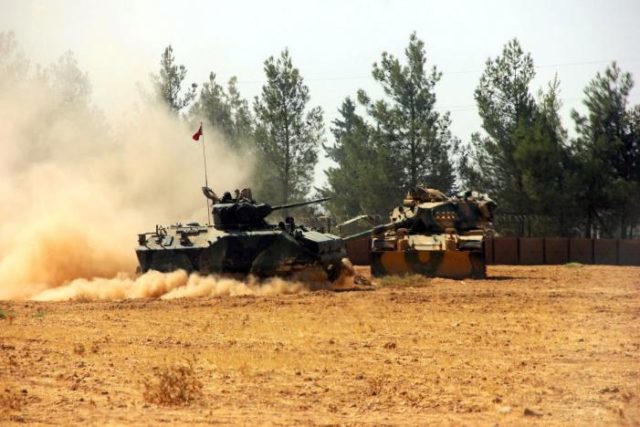
Turkey launched a predawn offensive into Syrian territory on Wednesday, sending tanks and special forces to confront Islamic State militants. The operation is the most significant action Ankara has taken since the Syrian Civil War began in 2011 but the attack also aims to contain recent advances made by Kurdish fighters.
With the backing of U.S. airstrikes, Turkish forces secured the border town of Jarablus on western side of the Euphrates river. According to reports on the frontline, 500 Syrian opposition fighters from the Free Syrian Army (FSA) joined the assault, capturing three other nearby villages. Forty-six Islamic State fighters have been killed in the confrontation so far.
Ankara has promised to “completely cleanse” IS from its border region, blaming the terrorist organization for a bombing this weekend that claimed the lives of 54 people at a wedding in Gaziantep, Turkey. However, the offensive also seeks to block the YPG, a Syrian Kurdish militia, from continuing its advance westward on the Syrian-Turkish border. Considered terrorist group by Turkey for its support of the separatist Kurdistan Worker’s Party (PKK), the YPG has worked successfully with U.S. forces to capture and keep territory from IS in northern Syria. Jarablus was next in the group’s sights after capturing Manbij last month.
It is against this backdrop that Vice President Joe Biden arrived in Ankara for high level meetings with Turkish officials. At a press conference with Prime Minister Binali Yildirim, Biden reiterated the importance of the partnership with Kurdish Peshmerga in defeating IS but publically acknowledged there should be a limit to the YPG’s advances. “We have made it clear to Kurdish forces that they must move back across the (Euphrates) river,” Biden said. “They cannot and will not get American support if they do not keep that commitment. Period.”
While the Obama administration seems to have acceded to Turkey’s strategy, it risks leaving behind its most effective partner on the ground, the Kurdish forces. The strategy to defeat the IS in the rest of Syria seems more uncertain. U.S.-backed Syrian opposition fighters continued to get pummeled by the Russian air force and squeezed by regime loyalists.

